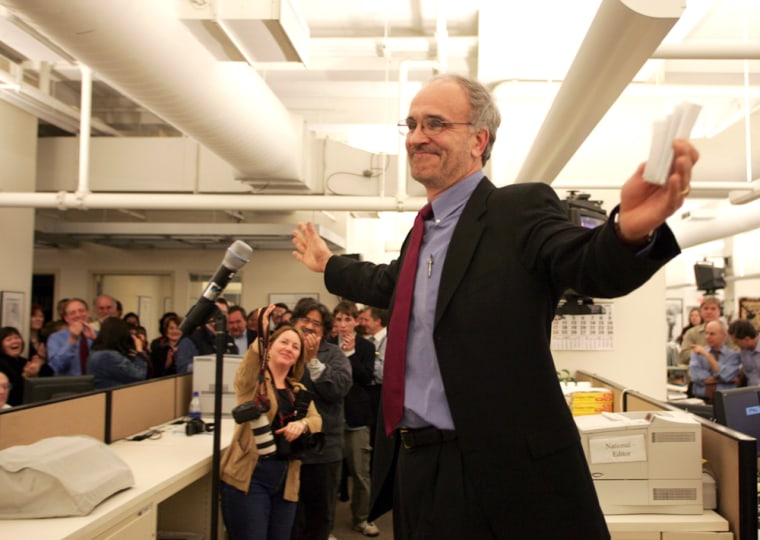The Los Angeles Times and The Wall Street Journal captured two Pulitzer Prizes apiece Monday, with the Times winning the public service award for exposing racial injustice at an inner-city hospital and the Journal cited for its incisive stories about the plight of cancer survivors.
Two other entries with medical themes were honored as well. Deanne Fitzmaurice of the San Francisco Chronicle won in feature photography for a photo essay on an Oakland hospital’s effort to mend an Iraqi boy nearly killed by an explosion. And Boston Globe reporter Gareth Cook’s story detailing the complex scientific and ethical dimensions of stem-cell research won for explanatory journalism.
The Associated Press won in breaking news photography for a series of pictures of bloody combat in Iraq. The award was the AP’s 48th Pulitzer.
As a crowd gathered around the photo desk at AP headquarters, President and CEO Tom Curley stood atop a chair beside Executive Editor Kathleen Carroll to congratulate the staff.
‘These folks showed incredible courage’
“These folks showed incredible courage this year,” Curley said. “They took some extraordinary pictures, they captured some incredible moments in history and they did it in a way that made all of us proud.”
Unlike last year, when the Los Angeles Times won five Pulitzers, this year’s awards were widely distributed. The Star-Ledger of Newark, N.J., won in breaking news for its coverage of New Jersey Gov. James E. McGreevey’s resignation after he admitted having an affair with a male lover who was appointed as the state’s director of homeland security.
It was only the paper’s second Pulitzer in 173 years, and its newsroom erupted in exultation when the award was announced. “It’s very satisfying because it’s an award for the whole paper,” said Star-Ledger Editor Jim Willse, who estimated that about 100 staffers were involved in the coverage.
Another story involving a politician’s misdeeds — a former governor’s sexual misconduct with a 14-year-old girl while he was a mayor — earned Nigel Jaquiss of the Willamette Week of Portland, Ore., a Pulitzer for investigative reporting.
“I’m really surprised — it’s just a tremendous honor. I never thought it would happen to me,” Jaquiss, a former Wall Street oil trader, tearfully told his colleagues at the alternative weekly, which has an unpaid circulation of 90,000.
Following up leads that larger papers had overlooked, Jaquiss documented three years of sexual misconduct involving Neil Goldschmidt, then mayor of Portland, and his 14-year-old babysitter. Goldschmidt later became governor and transportation secretary under former President Carter.
‘Unseen world of cancer survivors’
The Wall Street Journal’s Amy Dockser Marcus won in beat reporting for her “masterful” stories about patients, families and physicians that “illuminated the often unseen world of cancer survivors,” the judges said. The paper’s other award, for criticism, went to Joe Morgenstern for his movie reviews.
Walt Bogdanich of The New York Times won for national reporting for stories about the corporate cover-up of responsibility for deadly accidents at railroad crossings. It was Bogdanich’s second Pulitzer: He won in 1988 for specialized reporting while at The Wall Street Journal for a series on faulty testing by medical laboratories.
Two prizes were awarded for international reporting: Kim Murphy of the Los Angeles Times for her reporting from Russia and Newsday’s Dele Olojede for his look at Rwanda a decade after its genocidal civil war.
In awarding the public service citation, the judges praised the Times for “its courageous, exhaustively researched series exposing deadly medical problems and racial injustice” at a public hospital in Los Angeles. The hospital has suffered patient deaths blamed on poor nursing; lawsuits filed by patients who had medical objects left inside them; and mismanagement that has threatened its federal funding.
The county in November voted to close the hospital’s trauma unit so the hospital can focus on improving overall operations. Last week, a national hospital accreditation agency revoked the hospital’s credentials.
“There were families down there who, time and again, were willing to speak to us about losing their loved ones in the hospital — probably the worst day of their lives,” said Steve Hymon, one of four reporters who worked on the series. “The story wouldn’t have the weight that it did without them.”
Tribune, Plain Dealer writers win
Julia Keller of the Chicago Tribune won for feature writing for her reconstruction of a deadly tornado. Connie Schultz of The (Cleveland) Plain Dealer won in the commentary category. She submitted 10 columns on topics ranging from Ohio’s gay marriage ban to how managers at a restaurant were taking money from the tip jar at the coat check.
A teary-eyed Schultz, who became a columnist two years ago, wore a tiara and clutched several bouquets as colleagues celebrated her victory.
Tom Philp of The Sacramento Bee won for editorials calling for the restoration of California’s flooded Hetch Hetchy Valley in the Sierra Nevada.
Nick Anderson of The Courier-Journal of Louisville, Ky., won for editorial cartooning for his unusual graphic style that produced “thoughtful and powerful messages,” the judges said.
Each prize is worth $10,000, except for public service, which is recognized with a gold medal. The awards are given by Columbia University on the recommendation of the 18-member Pulitzer board, which considers nominations from jurors in each category.
